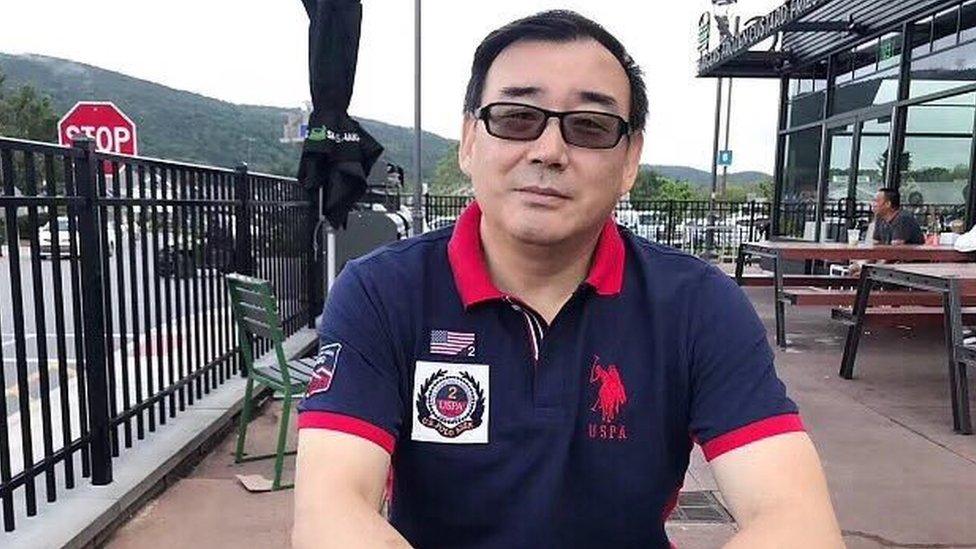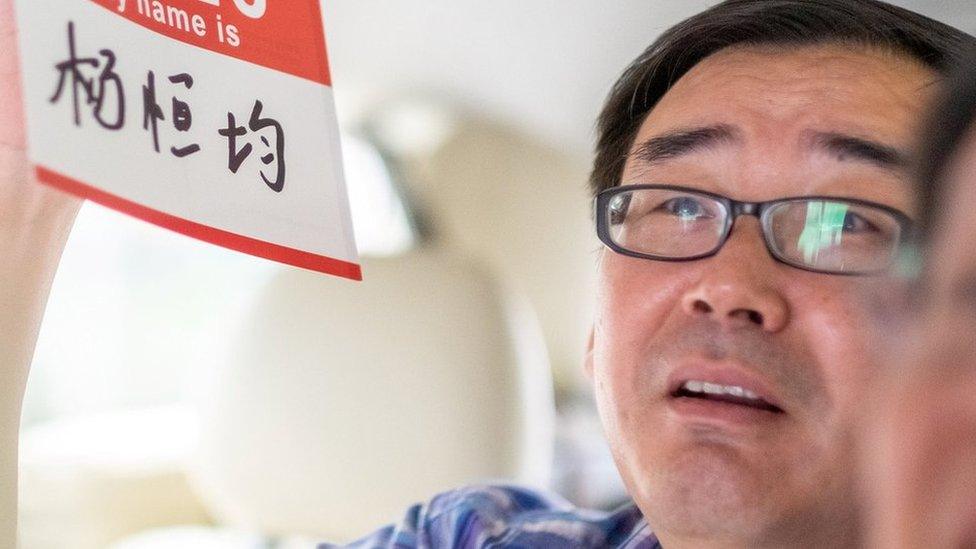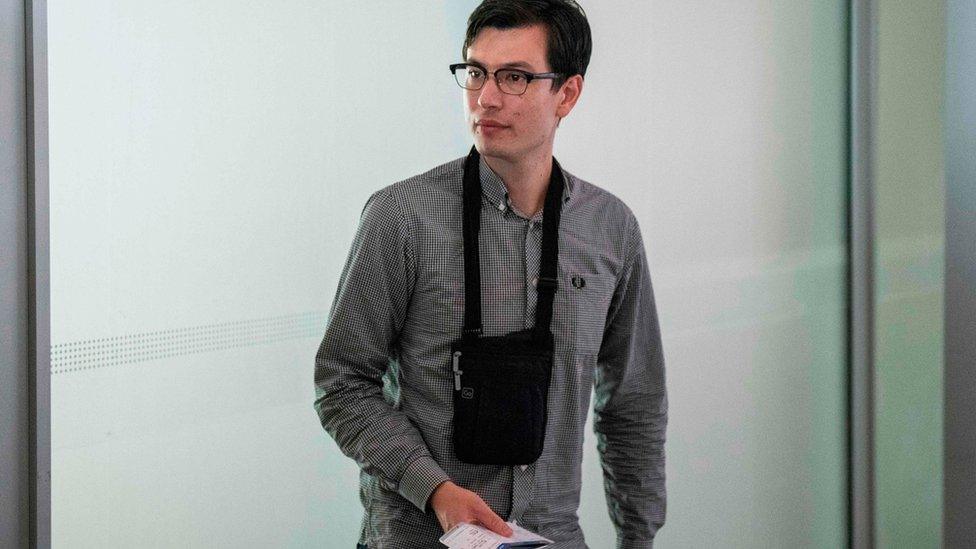Yang Hengjun: The Australian writer held by China for six months
- Published

Yang Hengjun is a popular blogger and former Chinese diplomat
In January this year, Chinese-Australian writer Yang Hengjun went missing in China. Six months on, his family still don't know where exactly he is, nor when he might come home.
China has confirmed he is being held on suspicion of "endangering national security". But his supporters have raised concerns about where he is being held and what they say are violations of his human rights.
Then on Sunday, his wife Yuan Ruijuan - who has been prevented from seeing her husband - was briefly detained by Chinese authorities after unsuccessfully trying to leave the country.
So what will happen to Mr Yang, 53, and is his case, as some argue, receiving insufficient scrutiny?
A case with few known details
Before his detention, Mr Yang, an Australian citizen, wrote a popular Chinese-language blog on current affairs in China and international relations. He was active on Chinese social media and Twitter, where he has more than 130,000 followers.
"He is one of the most influential bloggers on political issues in China, where he's earned the nickname of 'Democracy Peddler' through talking about democracy and human rights," his friend Feng Chongyi, a Sydney academic, told the BBC in January.
Mr Yang was living in New York, but travelled to China in January with Ms Yuan and her child - both Chinese citizens - on a visa run. They arrived in the southern city of Guangzhou and were awaiting a connecting flight to Shanghai. While Ms Yuan and her son were allowed to board their connecting flight, Mr Yang was escorted from the airport by authorities and detained.
China has held him for alleged "involvement in criminal activities endangering China's national security" ever since. He is in "residential surveillance" - a term often used when Chinese investigators hold a suspect in an unknown location.

Yang Hengjun has blogged about political issues in China
Mr Yang's Australia-based lawyer, Robert Stary, says he does not know his client's exact whereabouts.
He says Mr Yang is being held in a cell flanked by guards and constantly lit - a practice banned under UN rules for detaining prisoners, external. Though he has been visited by Australian consular officials, Mr Yang does not have access to his lawyer and has not been charged, says Mr Stary.
Rights groups say the lack of legal representation or oversight raise concern about interrogation methods.
Chinese authorities have not commented on the circumstances of his detention.
Calls for release
Mr Stary says the detention order allows the authorities to hold Mr Yang in custody for up to six months, which is due to expire on 18 July.
"He has been described as a journalist and democracy activist, and in the absence of him being charged, he should be released to Australia," Mr Stary says.
Mr Stary says "fundamental basics" of human rights are being impinged by Mr Yang's ongoing detention and questioned why more wasn't being done for his release.
His case is particularly relevant in what has been described as a "sensitive year" for China, adds Mr Feng, citing the 30th anniversary of the Tiananmen Square crackdown and recent Hong Kong extradition protests.
Returning to Tiananmen Square for the first time in 30 years
"Dr Yang has been a very influential political blogger who has great capacity to mobilise support for political protest," Mr Feng said this week.
Foreign Affairs Minister Marise Payne has said Australia continues to seek the reasons for his detention.
"If he is being detained purely for his political views then he should be released," she said in a statement this week.
'If I disappear again, remember my articles'
This is not the first time Yang Hengjun has gone missing in China. In 2011, he disappeared from Guangzhou airport before re-emerging and attributing his absence to a "misunderstanding".
Later, however, he gave Mr Feng a letter with instructions to release it if he was ever arrested again. Mr Feng made the letter public in January.
In the letter, he urges activists to "maintain belief in China's democratic future, and, when it doesn't put yourself or your family at risk, to use all your means to push China's democratic development to happen sooner". He implores his supporters to push for "freedom, human rights, the rule of law, and justice to occur sooner" in China.
"If I can come out, I will continue my work. If I cannot come out or disappear again, remember my articles and let your children read them," he wrote.
The letter also addresses his 2011 disappearance, saying it was not in fact due to a "misunderstanding" - he had been arrested.
What happened to Yuan Ruijuan?
Last Sunday she was briefly questioned as she tried to leave China.
She has told the Australian government that she is now subject to an exit ban restricting her from leaving China, but that she is not in detention. At least three of her mobile phones were confiscated, she said.
She has been a vocal supporter of her husband. Before she was detained on Sunday, Ms Yuan had been due to give an interview to the Australian Broadcasting Corporation. Earlier this year, she penned an open letter to Chinese President Xi Jinping requesting the release of her husband.
Elena Collinson, a senior researcher at the Australia-China Relations Institute, says Ms Yuan's public advocacy may have displeased Chinese officials. They may also have planned "the use of her detention as leverage against her husband", she says.
Recent debates about political influence have strained relations between Australia and China
Ms Collinson adds China has "shown an appetite for adopting retaliatory measures taking the form of hostage diplomacy", pointing to the case of two Canadian citizens it accused of spying. Many saw it as a tit-for-tat action following Canada's arrest of Huawei executive Meng Wanzhou last December.
"While [Dr Yang's] case may not be quite as clear-cut, the possibility should not be ruled out as tensions on some fronts continue to simmer between Australia and China," she says.
Pressure on Australia
Mr Stary has questioned whether the Australian government has sufficiently pursued Mr Yang's case with China, noting it is Australia's biggest trading partner, as it has in cases of citizens detained by other countries.
The Australian government says Mr Yang's case has been raised repeatedly at senior levels. It does not have consular access to Ms Yuan because she is not an Australian citizen, but says it has asked China to permit her to travel to Australia.

Alek Sigley, an Australian student, was released last week after being detained in North Korea
Mr Stary has accused the Australian government of "splitting hairs" in Ms Yuan's case. "She's a permanent resident and she's married to an Australian citizen. She should be protected," he says.
Mr Feng says there are two likely outcomes once Mr Yang's six-month detention period is up.
"One, that they release him because they have insufficient evidence, or two that they will lay a formal charge and send him to a formal detention centre," he says. "They may allow him a lawyer at that stage."
"He may go into the second stage [the formal detention centre] and they will hold him for as long as they want to with no consequence for them."
Mr Feng's message to Australia was to ask them to "pull out all the stops and ask for his immediate release".